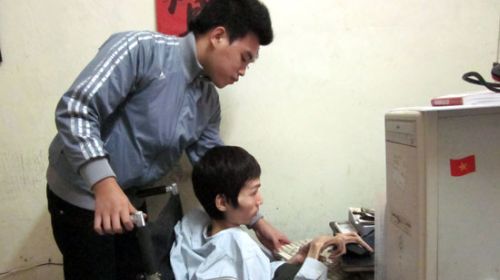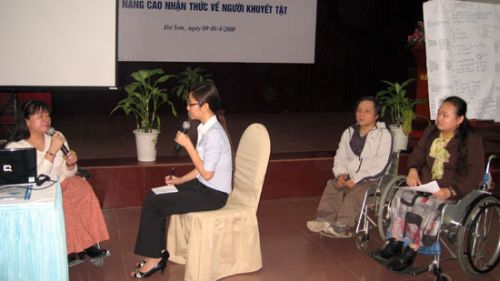Enhancing job opportunities for people with disabilities
(VOV) -Vietnam has lost 3 percent of its GDP as the result of the involuntary exclusion of persons with disabilities from the labour market.
Jobs seem to be too big a dream to achieve
Ngo Thi Kim Oanh no longer believes in luck and has given up her job hunt after four years of trying in vain. Despite her education background, the 38-year-old – who suffers from some physical disability because of cerebral palsy – cannot stand the discriminating look from employers.
After graduating from the Hanoi Foreign Languages University and struggling to find jobs for several years, Ms Oanh was recruited by some foreign non-profit organizations on short-term contracts to help other people with disabilities but those projects ended in 2008, leaving her with no job prospects again.
For Ms Oanh and the more than 15 percent of Viet Nam’s population, living with disability, jobs seem to be too big a dream to achieve although they are still able to work.

According to the International Labour Organization (ILO), Vietnam loses about 3 percent of its GDP as the result of the exclusion of persons with disabilities from the labour market.
The ILO is partnering with Irish Aid to promote employment opportunities for this disadvantaged group, as part of a 2012-13 programme worth more than US$250,000.
“It is important to remove barriers against women and men with disabilities, for the benefit of not only those individuals and their families but also their community and wider sections of society,” said Geneva-based ILO Lead Expert on Disability Barbara Murray.
In Vietnam, only a few of them have stable jobs and regular incomes and many others remain outside of formal employment. Compared to other groups of workers, their unemployment rate is much higher, at about 30 percent. “This is a terrible waste of potential,” said Ms Murray.
On the occasion of International Day of Persons with Disabilities (December 3), the ILO, the Irish Embassy and the Irish AIDS announced six research grants worth nearly US$6,000 to students of the Hanoi Law University. The grants will support undergraduate and postgraduate research projects on the Law on Disability starting in 2013.
The organizations have also supported the teaching of the law since the start of 2012. The assistance, which will finish next year, costs $10,000.
“It’s time to change social attitude towards people with disabilities!”
According to 37-year-old hearing-impaired Nguyen Tuan Linh, with the national Law on Disability, the State wants to help people with disabilities integrate into the community but “local governments think and do differently”.
The exclusion of people with disabilities from the labour market means a hard life for them and their families. One in every four households with a family member with disability lives below the poverty line, according to the 2009 Vietnam Population and Housing Census.
Mr Linh said people with disabilities have inadequate access to education and training, which makes it more difficult for them to get a job.
Born in Haiphong he is the only person in the northern region who has a teachers’ college degree and is now teaching deaf students at the Central Teachers’ College in Ha Noi.
However, he recalled his schooling was “really tough, three to five times harder than normal people”. He had completed secondary education at the age of 26 and finished college last August.
According to the United Nations Population Fund (UNFPA), literacy rates for people with disabilities are 73 percent in urban areas and 63 percent in the countryside, well below the national rate of 95 percent.
Vice chairwoman of the Hanoi Deaf People Association Vu Thuy Linh said it’s important to develop special curricula and teaching materials for children with disabilities so that they can have education at an early age and develop normally.

Meanwhile, for ILO specialist Murray, there is no single way to help people with disabilities in Viet Nam seek stable employment.
The first important step is to stimulate the effective implementation of employment laws and policies concerning this disadvantaged group.
People with disabilities should be given access to skills training that are needed in the labour market and supported in looking for jobs, said Murray, whereas employers should be encouraged to provide opportunities and suitable working conditions for those with disabilities.
